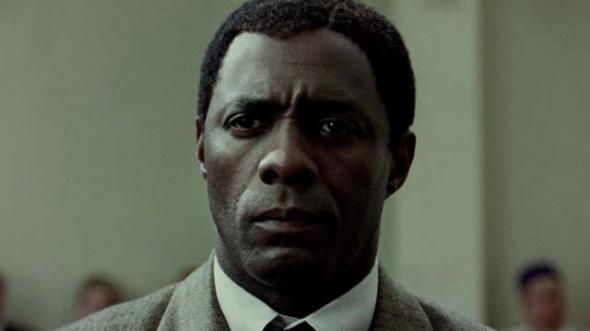Though it has already broken box-office records in South Africa, the new biopic Mandela: Long Walk to Freedom has gotten mostly middling reviews, or worse. Scott Tobias of the Dissolve wrote that this “dull, glossy, and uncomplicated film” provides “a lesson in how not to make a historical biopic.” Writing in Variety, Scott Foundas called it “stolidly reverential, shackled to the most dire conventions of the mythmaking biopic, and very much a white man’s view of the ‘dark’ continent.” Even the closest it got to a rave, from Stephen Holden of the New York Times, focused mainly on the film’s universally praised pair of central performances: Idris Elba as Nelson Mandela and Naomie Harris as his second wife, Winnie.
But a day after the great man’s death at age 95, there’s a case to be made that, for people newly interested in Mandela’s life and times, you could do worse than Mandela: Long Walk to Freedom. (Much worse.) Yes, the film makes the obtuse error of trying to cram his entire extraordinary life—and by extension South Africa’s anti-apartheid movement and its revolutionary transition to majority rule, both of which have become nearly synonymous with Mandela—into a feature-length running time. And yes, it commits all manner of petty biopic crimes, from entombing its star in old-age makeup to blasting Bono over the credits.
Where the film is strongest, though, is in its depiction of Mandela’s early adult life and the years immediately preceding his imprisonment on Robben Island—exactly the era that most Americans, accustomed to their image of Mandela as the kindly, beatific grandfather of a nation, know the least about. There is precious little footage of the young Mandela, which seems to have been a boon to the filmmakers and to the magnificent Elba—freeing them to imagine the dashing young Johannesburg lawyer and shrewd, magnetic resistance fighter without having to check their work against a massive audiovisual record.
I’ve noticed on social media in the last day that many people, especially younger people, seem shocked that Mandela and other members of the African National Congress were only removed from the U.S. terror watch list in 2008. (Really, they seem shocked that they were ever on the list in the first place.) Those who dig a little deeper appear even more shocked that Mandela, a true paragon of grace and forgiveness, also co-founded Umkhonto we Sizwe (Spear of the Nation), the militant armed wing of the ANC. For newcomers to the history, Mandela usefully lays out—albeit in simplified, super-streamlined form—a context for these facts, depicting the literal war being waged against black people by a white supremacist government, and showing how the apartheid government branded the act of oppressed people taking up arms in a war already being waged against them as “terrorism.” The film doesn’t make these points subtly or artfully. But it makes them, and that’s something.
Really, though, the top reason to check out Mandela this weekend is for those two performances. Elba looks nothing like Mandela, but his charisma sparks and pops off the screen—he walks into a room and you can sense the electrons in the air rearranging themselves. This is the guy that anyone would follow into battle. Elba always lets you watch Mandela think, whether he’s struggling to maintain his famous composure after hearing in prison of his son’s death or calmly outmaneuvering a squad of white government officials in negotiations preceding Mandela’s release.
And if Elba humanizes a secular saint, Harris pulls off a perhaps more difficult feat in conjuring empathy and understanding for Winnie Mandela, whose reputation was irreversibly tarnished when she was implicated in multiple counts of assault, kidnapping, murder, and attempted murder in the late 1980s. The movie doesn’t excuse Winnie Mandela’s crimes, but in portraying the South African government’s reign of terror against her and her children—including harrowing night raids, constant harassment, house arrest, and, at one point, a spirit-breaking 17-month stint in solitary confinement—it allows Harris to suggest how a brilliant and idealistic young woman might have been literally, systematically driven insane by an insane regime. That’s an achievement—and so is Mandela: Long Walk to Freedom, at least in those moments when it gets out of the way of its actors and its history.
